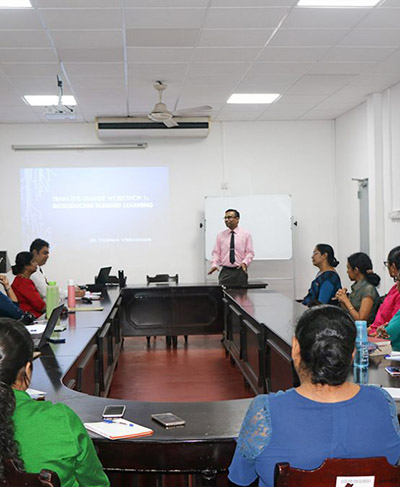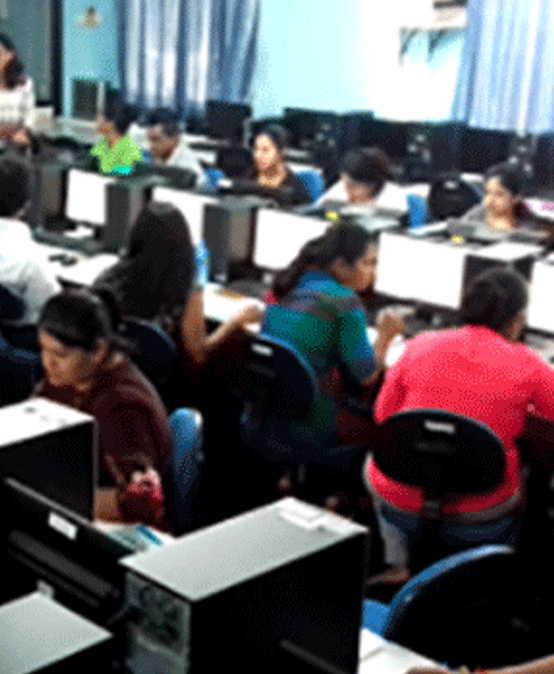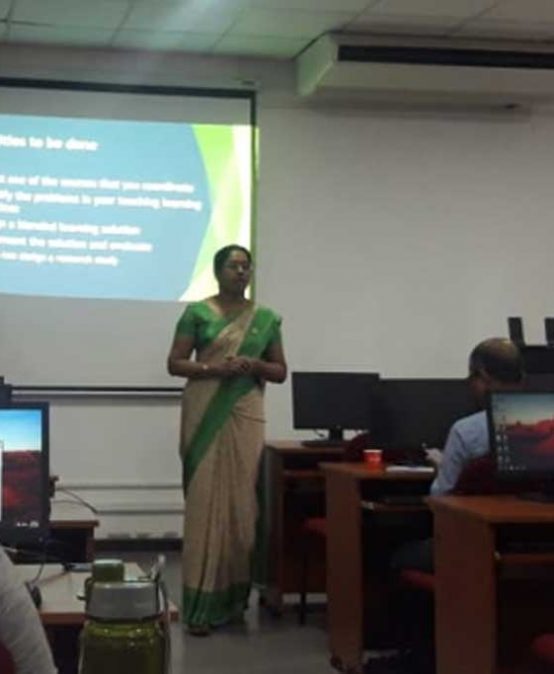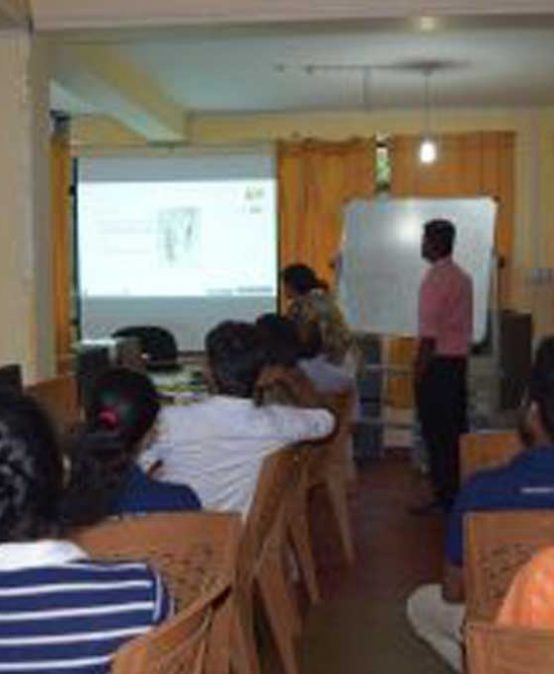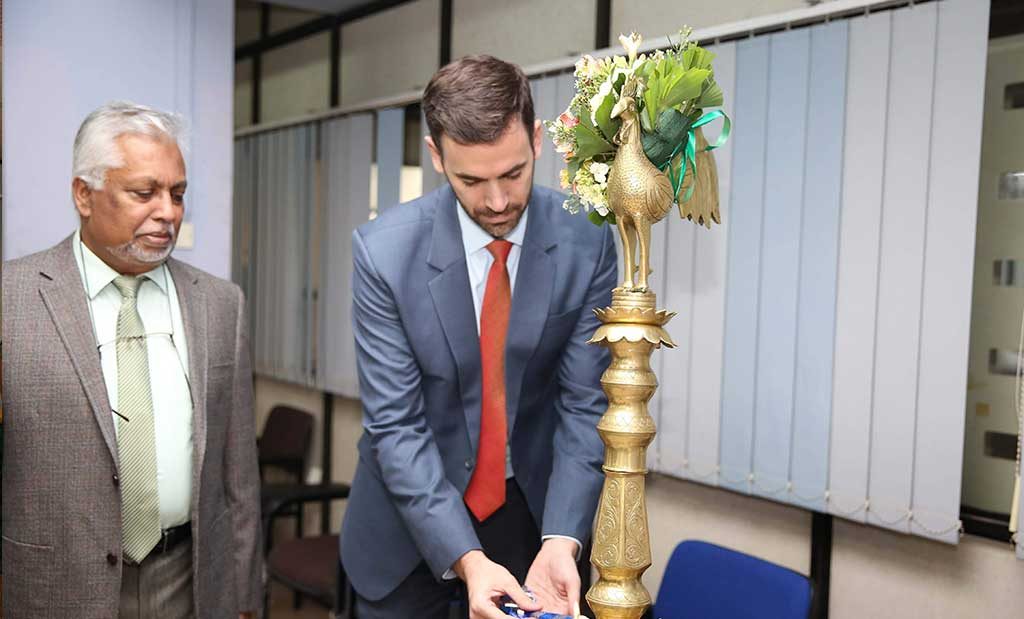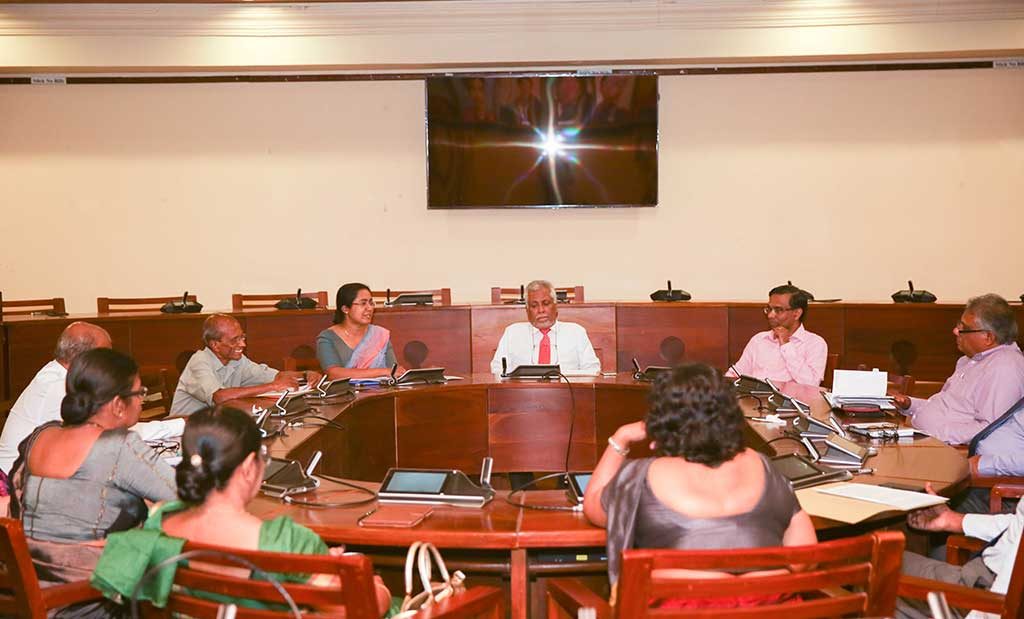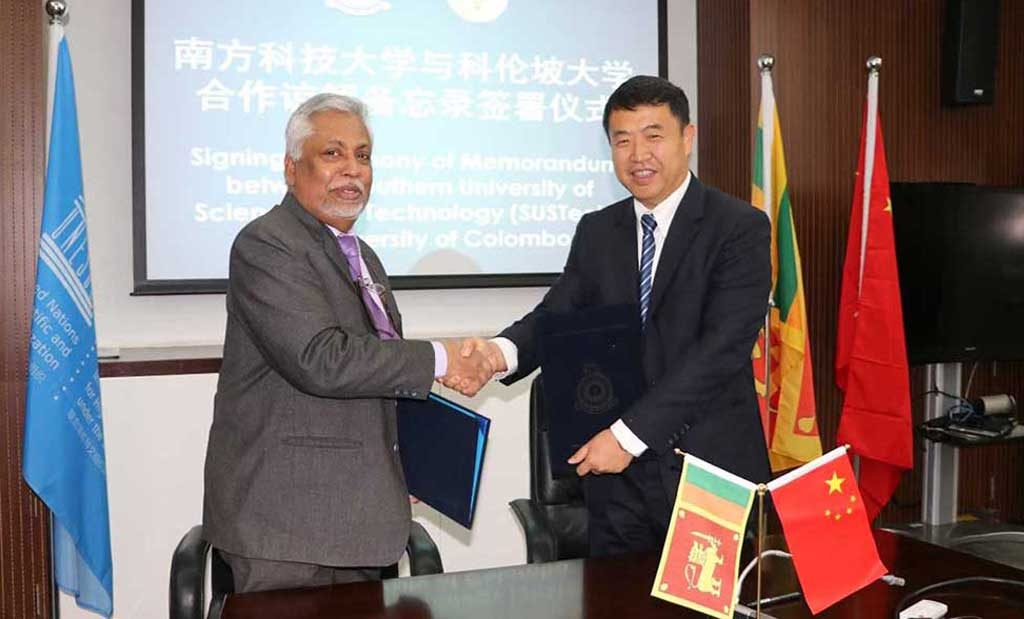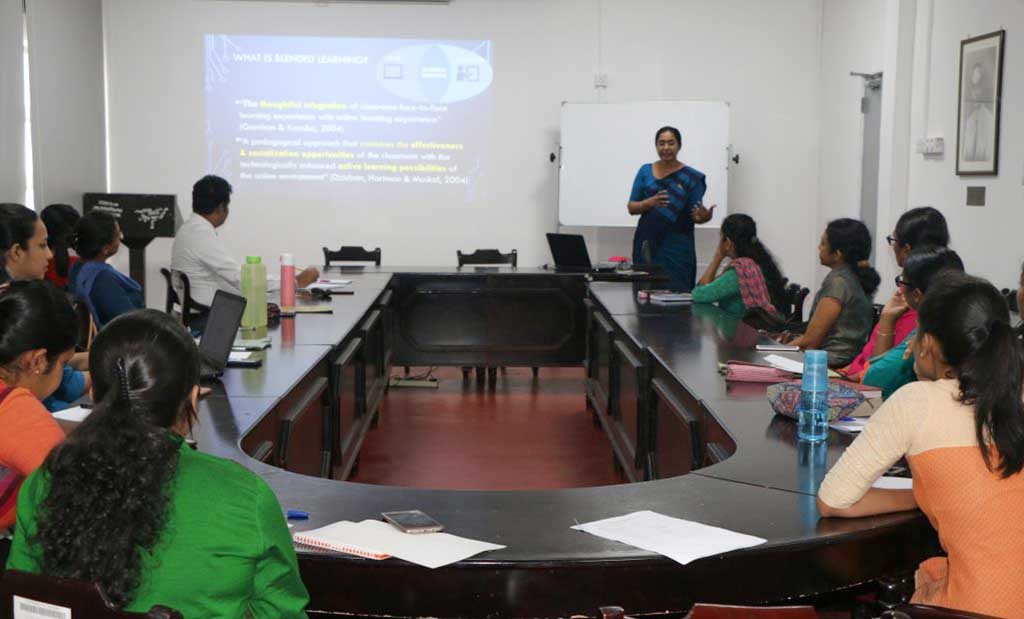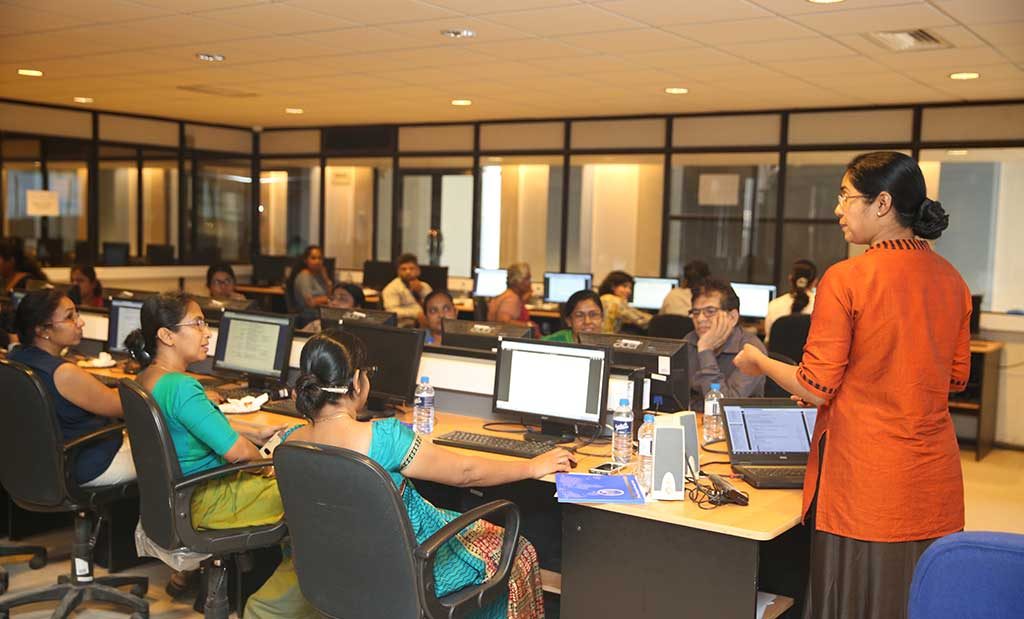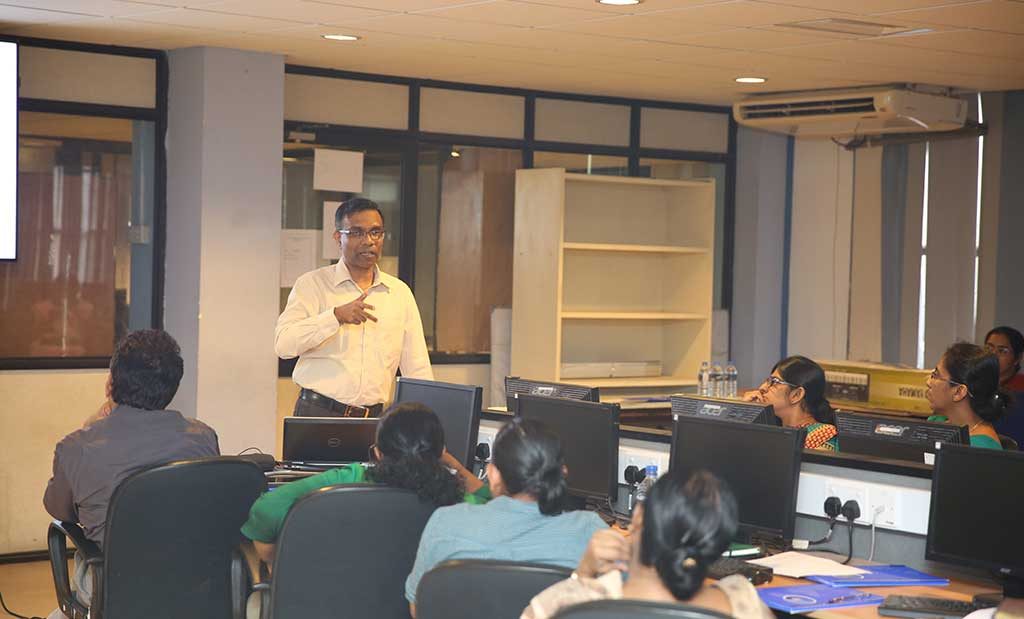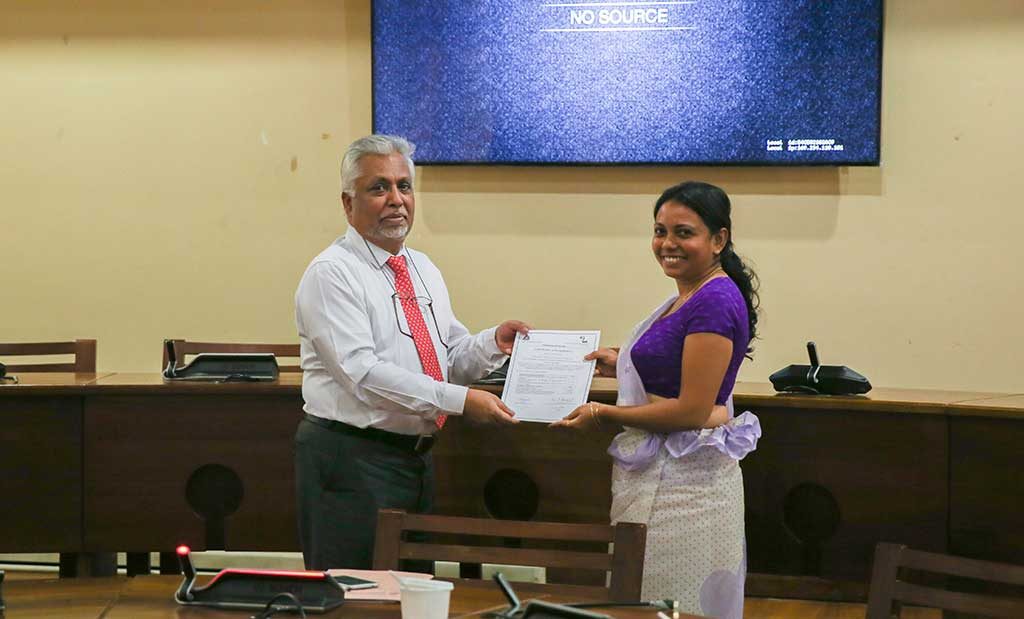Blended Learning Project
 The University of Colombo was chosen as a lead implementing partner for a new UNESCO project on ICT-driven innovation; Seizing Digital Opportunities in Higher Education: Building staff capacity for ICT-driven innovation in Cambodia and Sri Lanka. This project is supported by the Shenzhen Municipal Government within the UNESCO-Shenzhen Funds-In-Trust Framework (SFIT).
The University of Colombo was chosen as a lead implementing partner for a new UNESCO project on ICT-driven innovation; Seizing Digital Opportunities in Higher Education: Building staff capacity for ICT-driven innovation in Cambodia and Sri Lanka. This project is supported by the Shenzhen Municipal Government within the UNESCO-Shenzhen Funds-In-Trust Framework (SFIT).
With support from the UNESCO-Shenzhen Funds-in-Trust Framework (SFIT), University of Colombo joined a highly participatory process to assess student experiences and staff capacities to enhance blended learning and support effective institutional governance
Phase I - Blended Learning Project
Under the Phase I of the project Seizing Digital Opportunities in Higher Education: Building staff capacity for ICT-driven innovation in Cambodia and Sri Lanka, a number of activities were carried out in 2017 by the University of Colombo
SUMMARY OF WORK CARRIED OUT IN 2017
| Deliverable | Date | Status |
|---|---|---|
| Draft press release on project launch at the University of Colombo | 28thJuly 2017 | Completed |
| Self‐assessment for ICT‐driven innovation and draft list ofinstitutional governance indicators | 31stAugust 2017 | Completed |
| Carrying out two capacity development programmes by theUniversity of Colombo School of Computing (UCSC) and StaffDevelopment Centre (SDC) to develop discipline-appropriate teachingand learning environments | 31stOctober 2017 | Completed |
| Launching a pilot course with sustainable blended learning featuresin selected courses at the University of Colombo, including at the PostGraduate Institute of Medicine | 30thNovember 2017 | Completed |
Step 1: Press release on project launch at the University of Colombo
The information was telecasted in the News programmes on Rupavahini and Eye TV channels and published in local newspapers (The Island and Diwaina)
Step 2: Findings from the self‐assessment and the list of Key Performance Indicators (KPIs)
▪ Identified KPIs and areas that need further improvement
According to the results of the self-assessment, none of the dimensions (Vision and philosophy, Curriculum, Professional Development, Learning Support, Infrastructure, Facilities, Resources and Support, Policy and Institutional Structure, Partnerships, Research and Evaluation) has reached its top most level. Therefore, University of Colombo has to take necessary actions to address issues in all these areas. More specifically the University should revise existing strategies or develop new strategies to improve 5 of the major areas: (1) Professional Development (2) Infrastructure, Facilities, Resources and Support (3) Partnerships (4) Policy and Institutional Structure (5) Research and Evaluation.
Step 3: Staff capacity development programmes
▪ Two capacity development programmes were carried out by the University of Colombo School of Computing (UCSC) and Staff Development Centre (SDC) to develop discipline-appropriate teaching and learning environments
Schedule of the capacity development programmes:
| Programme at SDC | Date | Time |
|---|---|---|
| Student Activities for Outcome based education and Constructive alignment | 11-10-2017 | 9:00-12:30 |
| Reviewing characteristics of andragogy to engage students in learning activities | 25-10-2017 | 9:00-12:30 |
| Reviewing Student Activities and needs: from a brick and mortar to an online campus | 16-11-2017 | 9:00-12:30 |
| Programme at UCSC | Date | Time |
| Preparing courses in LMS (optional) | 16-10-2017 | 13:00-17:00 |
| The role of a e-facilitator | 16-10-2017 | 13:00-17:00 |
| Major models of blended learning | 16-10-2017 | 13:00-17:00 |
| Different types of tools and techniques | 16-10-2017 | 13:00-17:00 |
| Blended development process | 23-10-2017 | 9:00-16:00 |
| Designing a blended learning activity | 23-10-2017 | 9:00-16:00 |
| Development and implementation | 30-10-2017 | 9:00-16:00 |
| Evaluation and review | 20-11-2017 | 9:00-16:00 |
▪ A concept note on capacity development programmes was submitted
▪ Certificates for successful participants were awarded on 01st February 2018
▪ Participants of the China Study Tour did a presentation at the Senate Hall
| Participants of the study tour to China | ||
| 1 | Faculty of Arts | Dr. Priyanga Dunusinghe |
| 2 | Faculty of Education | Mr. Kapila Bandara |
| 3 | Sri Palee Campus | Ms. Sajitha Lakmali |
| 4 | Faculty of Technology/UCSC | Dr. Ajantha Atukorale |
| 5 | UCSC | Dr. Damitha Karunaratne |
Step 4: Draft courses with sustainable blended learning features
Launched pilot courses with sustainable blended learning features in selected courses conducted at the University of Colombo, including at the Post Graduate Institute of Medicine.
Academic staff from several faculties, institutes and the campus of the university were instructed and guided to develop sample blended learning activities during the capacity development programme held at the UCSC. The following list of entities completed the development of sample activities.
- Faculty of Education
- Faulty of Law
- Faculty of Management & Finance
- Faculty of Medicine
- Faculty of Science
- Institute of Biochemistry, Molecular Biology and Biotechnology (IBMBB)
- Institute of Human Resource Advancement (IHRA)
- Institute of Indegnous Medicine (IIM)
- Sri Palee Campus
- Institute for Agro-technology and Rural Sciences (UCIARS)
▪ PGIM completed the development of a blended learning course and submitted a report.
▪ All the entities, except PGIM were informed to improve their blended learning project proposals and submit them before 31st December 2017. Most submitted their improved proposals and while some needed more support to complete it. Those who could not complete were given a new deadline to submit their proposals (14th of February 2018).
MAJOR ACTIVITIES SUGGESTED FOR 2018
Small ground projects at each faculty, institute and campus
Blended learning champions trained at the capacity development programmes held in 2017 are to conduct capacity development programmes at their faculties and start developing blended learning courses. This will address the Professional Development dimension in the Blended Learning Framework introduced by UNESCO.
Infrastructure development
Each faculty, institute, and campus should get funds to develop infrastructure. They should have infrastructure development plans in their project proposals. This will address Infrastructure, Facilities, Resources and Support dimension in the Blended Learning Framework introduced by UNESCO.
Partnership and research collaboration
Each faculty, institute and campus can conduct research based on their blended learning course development. They will prepare action research plans and conduct research. The research activities will be designed considering theories and practices reported in the book, Blended Learning for Quality Higher Education: Selected Case Studies on Implementation from Asia-Pacific edited by C.P. Lim & L.B. Wang (2016).
The University of Colombo seeks partnership opportunities from China and other countries to conduct blended learning programmes and research. We would like to conduct online degree programmes with the collaboration of local and foreign universities or research institutes.
Phase II - Blended Learning Project
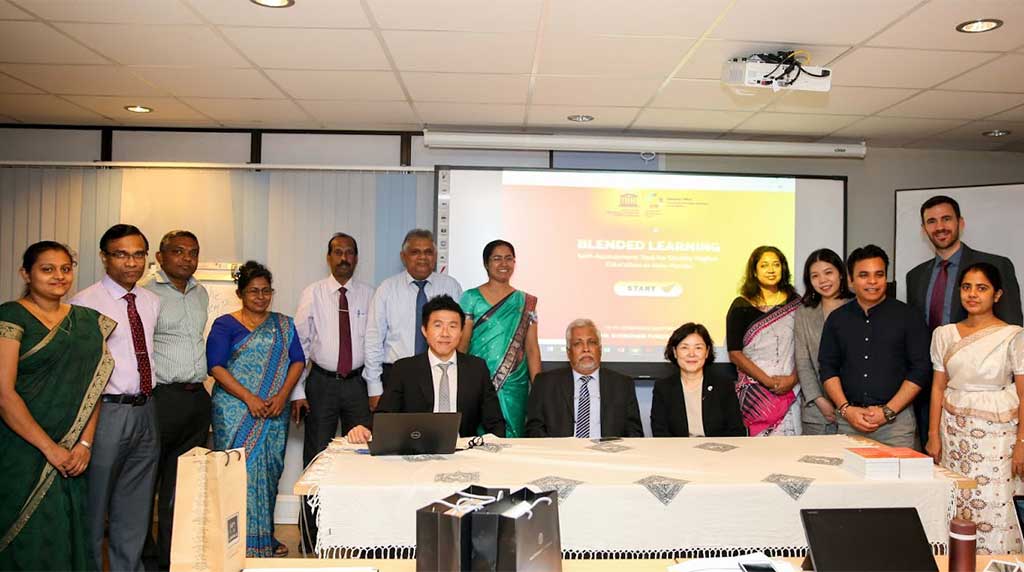 Following the successful completion of phase I of the UNESCO project on ICT-driven innovation; Seizing Digital Opportunities in Higher Education: Building staff capacity for ICT-driven innovation in Cambodia and Sri Lanka, a project supported by the Shenzhen Municipal Government within the UNESCO-Shenzhen Funds-In-Trust Framework (SFIT) – the University of Colombo was selected for a second phase of the project.
Following the successful completion of phase I of the UNESCO project on ICT-driven innovation; Seizing Digital Opportunities in Higher Education: Building staff capacity for ICT-driven innovation in Cambodia and Sri Lanka, a project supported by the Shenzhen Municipal Government within the UNESCO-Shenzhen Funds-In-Trust Framework (SFIT) – the University of Colombo was selected for a second phase of the project.
This phase of the project will focus on curriculum development through innovation grants, applied research on governance of blended learning, and strategies to scale and sustain blended learning at institutional and national level. The University of Colombo will be improving their curricula and developing institutional partnerships to sustain and scale blended learning for quality higher education with support of the UNESCO-Shenzhen Funds-in-Trust Framework (SFIT).
The project was launched on 4th September 2018 at the College House, University of Colombo in the presence of Senior Professor Lakshman Dissanayake, Vice Chancellor of the University of Colombo with the participation of the Deans of the faculties, the Directors of the institutes, the Rector of Sri Palee Campus and the faculty coordinators.
The phase II of the project aimed to;
At the initial stage of the project, the selected faculties and institutes developed curricula to suit the blended learning model based on the faculty level requirements. The overall purpose of this project on ICT-driven innovation was to increase access to quality higher education in Sri Lanka through technology and strategic partnerships that advance teaching and learning and promote effective institutional governance.
Summary of Work Carried Out and Results
The 2nd phase of the project attempted to improve the blended learning practices especially focusing on the five major areas which have been identified using the Self-Assessment Tool in the 1st phase of the project. The five major areas are;
- Professional development
- Infrastructure, facilities, resources and support
- Partnership
- Policy and institutional structure
- Research and evaluation
The 2nd phase of the project had three deliverables
- (a)Press release, (b) internal assessment of course syllabuses for 5 faculty innovation grants, and (c) expected learning outcomes of train-the-trainer programmes.
- A report on findings from applied research
- A Report on Visiting Faculty/International Partnership: Summary report with recommendations on how to sustain blended learning curriculum development at the university with actionable insights on scaling a localized self-assessment model
Completed Tasks
The University of Colombo identified staff training requirements for blended learning practices at five (5) entities which were selected based on the number of students in each entity and the quality of the degree programmes conducted. These five entities were; Faculty of Arts, Faculty of Law, Faculty of Finance and Management (Mgt), Institute for Agro-Technology and Rural Sciences (UCIARS) and the Sri Palee Campus. Staff training requirements were identified by conducting brainstorming sessions with senior academic staff members, while some staff members used questionnaires to assess students’ readiness for blended learning. Based on these findings, the university prepared curricula and schedules to conduct staff training programmes on blended learning activity development.
The next activity of the project was to conduct staff training programmes and support the staff to engage in applied research on blended learning. As shown in Table 1, 49 courses were developed and 49 research studies were conducted. The courses were evaluated and the best courses were selected to give recognition to the course developers.

Collaborative work and Internal Partnership
During the blended learning course development process the entities prepared teams having junior academics to play the role of multimedia learning content developers and senior academic staff members worked as Instructional designers and course developers. Academic support staff members played the role of technical assistants. Throughout this phase of the project, the selected entities received expert support from the UCSC and the Network Operating Centre of the university.
Summary of Results and Findings
The entities could upgrade their learning management systems, improve their knowledge, positive attitudes and skills required for successful implementation of blended-learning courses or activities. It was hard to practice blended learning at the entities without having crucial infrastructure such as computers and required software for teachers. Also the entities did not have suitable environment to create an interest to practice blended learning among the staff and students who often have negative attitudes towards blended learning practices. Considering these issues, the entities made plans to acquire infrastructure to support blended learning.
In order to determine the effect of the activities carried out during the project, the status of the blended learning at each entity was re-evaluated using the Self-Assessment Tool of Prof. Lim and Wang (2016). According to the results of this evaluation, all the areas stated above have been improved during the project. However four dimensions/areas: Research and evaluation, Partnership, Policy and Institutional structure, Infrastructure, facilities, resource and support are still at a comparatively low level.
Recommendations for Sustainability of b-Learning
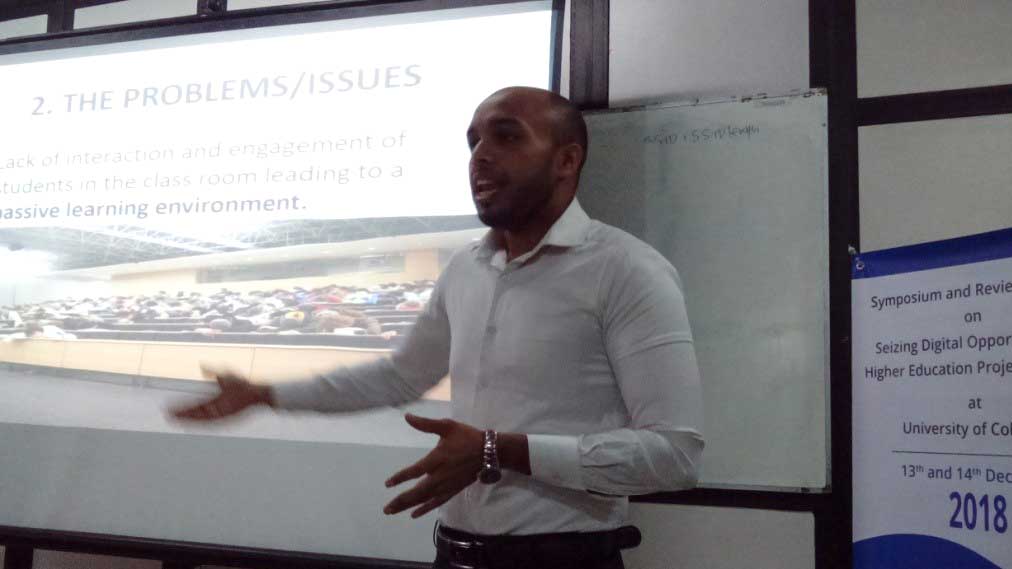 As seen above, for the sustainability of blended learning activities attention has to be paid to; 1) Research and evaluation, 2) Partnership, 3) Policy and institutional structure, 4) Infrastructure, facilities, resource and support. Changes to the organizational structure to support blended learning are also required. New job roles such as instructional designer, multimedia content developer, and online facilitator to provide 24/7 online support need to be introduced. Further, introduction of a new promotion scheme to encourage best practices of blended learning is important.
As seen above, for the sustainability of blended learning activities attention has to be paid to; 1) Research and evaluation, 2) Partnership, 3) Policy and institutional structure, 4) Infrastructure, facilities, resource and support. Changes to the organizational structure to support blended learning are also required. New job roles such as instructional designer, multimedia content developer, and online facilitator to provide 24/7 online support need to be introduced. Further, introduction of a new promotion scheme to encourage best practices of blended learning is important.
Poor level of infrastructure and technical services at the university was the main reason for the issues faced during implementation. Continuous monitoring, fault recovering and upgrading is essential for the smooth functioning of blended learning practices. Unexpected network break downs and power failures should be minimized as they can lose the students’ data on course access, activity completion and marks. Therefore, it is essential to have reliable and effective infrastructure and services for the sustainability of blended learning practices.
The capacity development programmes conducted during the project have to be continued in order to introduce new 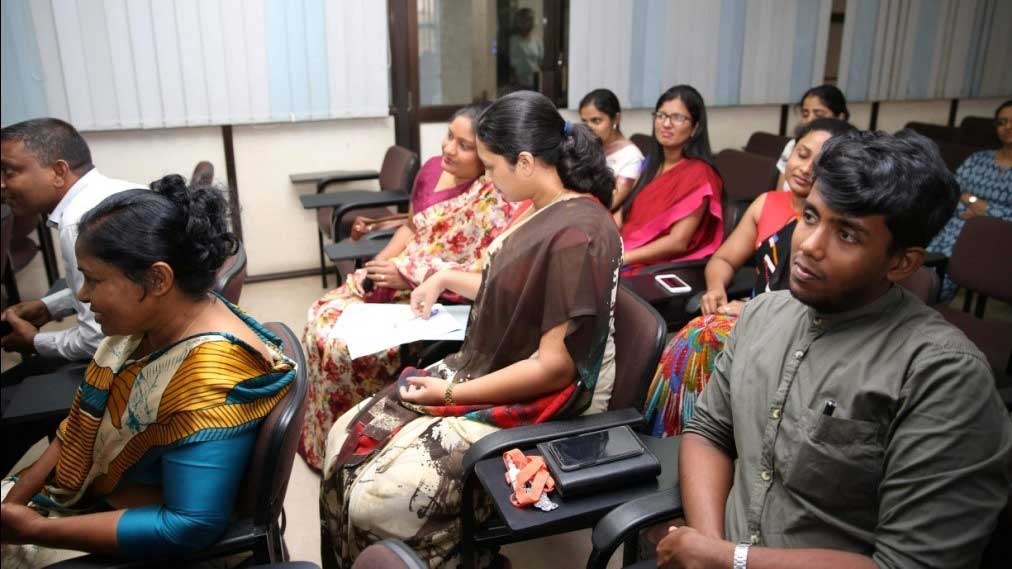 technologies and tools to design and develop blended learning activities. The participants of the capacity development programmes suggested to improve the curricula of the training programmes conducted by the Staff Development Centre (SDC) by including topics related to blended learning development. Since UCSC has the capacity to train academic staff on how to design, develop and conduct blended learning, the SDC could conduct their academic staff training programmes with the support of UCSC.
technologies and tools to design and develop blended learning activities. The participants of the capacity development programmes suggested to improve the curricula of the training programmes conducted by the Staff Development Centre (SDC) by including topics related to blended learning development. Since UCSC has the capacity to train academic staff on how to design, develop and conduct blended learning, the SDC could conduct their academic staff training programmes with the support of UCSC.
Such programmes should encourage research and development based on blended learning practices. With the financial support of the project, the university could conduct applied research on blended learning and hold a symposium. This type of activities will further encourage the academic staff to engage in blended learning and share their best practices with others.
While the self –assessment tool of Prof. Lim and Dr. Wang was used to assess the status of blended learning practices, several other rubrics and evaluation sheets as well as templates and guidelines were used. Based on the experience gained, it was seen that the Self-Assessment tool can be localized or adapted to make it more easily usable in a local context.
Future work towards implementing of partnership schemes
During the 2nd Phase of the project the team worked closely with UNESCO, especially with Mr. Wesley Teter and Ms. Himali Jindasa. This collaboration and the experience gained has shown that the team can go forward for another one or more phases of this project.
Moreover, the experience gained from this project, the university aims to create a cyber campus in the near future and open the courses to the world. Thus, we can conduct blended learning courses with international collaboration and partnership while sharing our knowledge on blended learning course development with other local and foreign universities.
In order to achieve this goal, the university seeks the following:
- Partnership with local and foreign universities to design, implement and conduct blended learning courses
- The possibility of introducing staff and student exchange programmes
- Opportunities for foreign training
- Collaboration with local and foreign universities to engage in research
- Collaboration with foreign universities to conduct blended learning conferences
- Possibility of getting visiting researchers from foreign countries and sending our staff as visiting researchers to other countries
